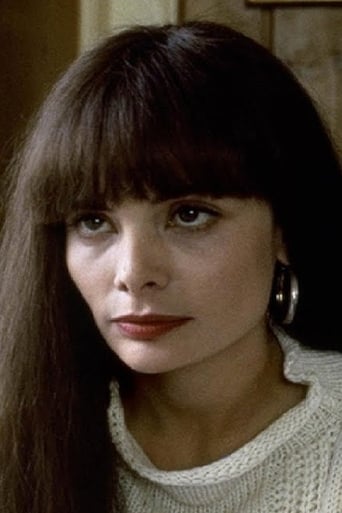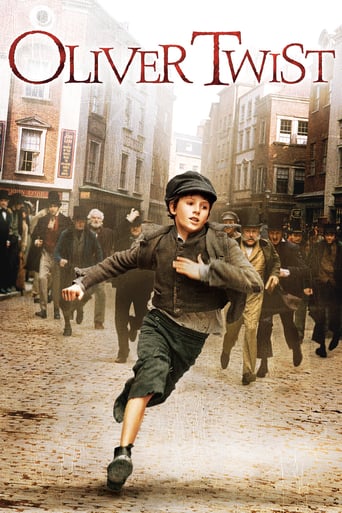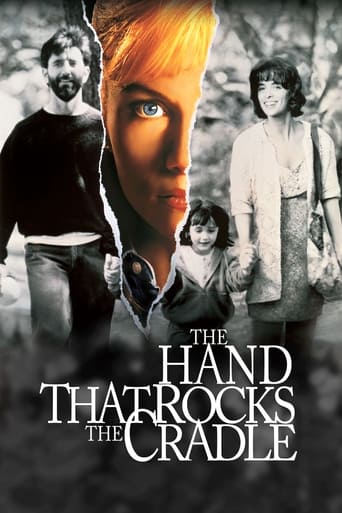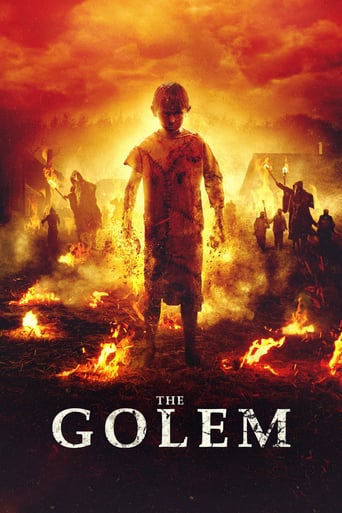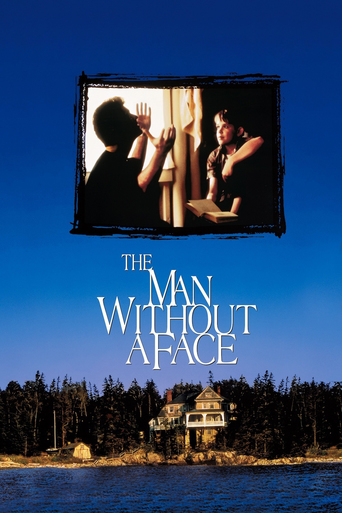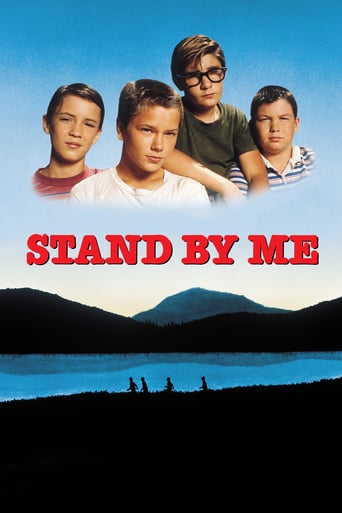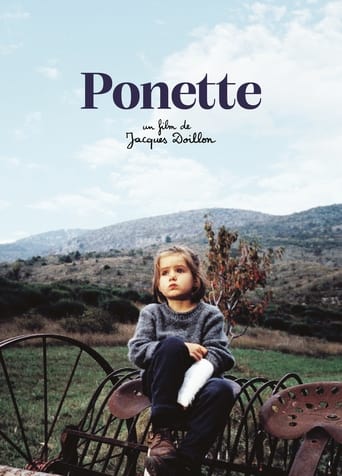
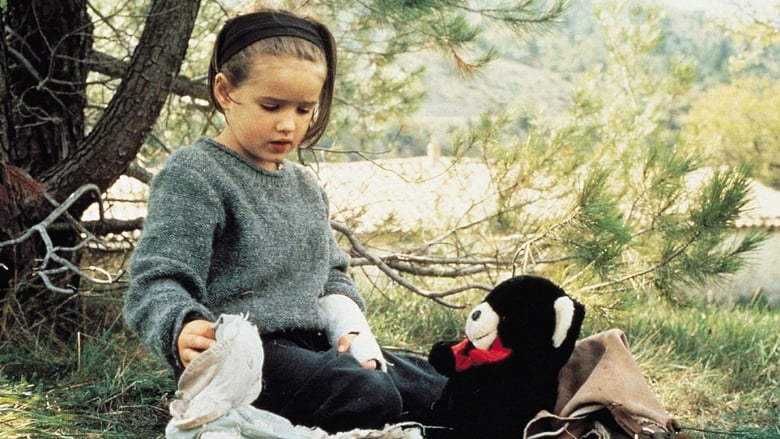
Ponette (1996)
After losing her mother in a car accident that leaves her with a broken arm, 4-year-old Ponette struggles with anguish and fear. Left by her father with a caring aunt and her children, Ponette grieves, secretly hoping her mother will somehow come back. Confused by the religious explanations provided by adults, and challenged by the cruel taunts of a few children at school, little Ponette must make her way through her emotional turmoil.
Watch Trailer
Cast


Similar titles
Reviews
This is a beautiful film. Watching it now as an adult I understand that there may have been some question of abuse. How can a little child know the difference between what's real and what's not to such an extent? It is truly moving to watch her cry in the prayer scene. Whatever your thoughts about whether or not this child should have been directed to perform this role, you cannot deny that it is a profoundly affecting portrait of childhood grief. A lot of people have complained that the ending is not conclusive enough, but I for one thought it was perfect. In life, things aren't usually wrapped up in a neat little package. All the actors in this film - especially the children - do an amazing job. One of my favorite films for many years.
Ponette is the story of a young French girl (4 years old) who's mother suddenly dies. It's a tough situation to explain to someone this young what exactly that means, and even more so when it's someone so close to them. The father, unsure of how to explain to Ponette that her mom is in fact, not coming back, and unable to convince her that the visions she keeps having of her mother being around every now and then, he sends her away for a while to live with friends and to cope with her loss as best as the adults and young friends around her can help her do.Victoire Thivisol, as the young Ponette, does a great job. I hadn't thought about it before that, as another view points out, this was not the fake sorrow of an actress with glycerine tears and such, all of the performance was real. And, although the story is interesting in that you see how a young kid might actually react to the death of someone they know and love, and how others might help them to cope with that, I was annoyed that about three quarters of the movie was Ponette crying over one thing or another. I suppose this is quite unsympathetic on my part to think that, damn, this kid is crying again? In all, I say that this film is for an audience that particularly enjoys its emotional dramas. Ponette has a lot to offer there. For others, the story may become either repetitive or just altogether dull to sit through, as at least one viewer has already expressed.
Ponette is a movie you will replay in your mind for a long time. I keep remembering bits and pieces of it. The adults in the movie -- we'll leave aside Ponette's father, for now -- all sincerely try to answer Ponette's questions about death, and the after-life, to the best of their abilities, and it is hard to fault what they tell Ponette. It sounds reasonable, theologically. And yet, it is ultimately unsatisfying because, in the adults, an emotional disconnect has occurred at some point between what they ~say~ they believe and what they, deep down, ~really~ believe. Or perhaps this disconnect was always there for them -- it's impossible to tell.Ponette has the kind of metaphysical purity and innocence that the nineteenth-century French philosopher Jules Lequyer praised in The Hornbeam Leaf. Such questions! Such observations! No adult would think to say, as Ponette did, when her cousin pointed out that his grandfather didn't come back from the dead, "No one was waiting for him." No adult would think that it mattered whether anyone was waiting. Ponette's cousin may not share Ponette's convictions, but he takes them seriously. When his mother remarks to him that Ponette is "playing" at waiting for her mother to return, he corrects his mother: "No, she's really waiting."Ponette's father, unlike the other adults in the movie, is an atheist. And yet, when Ponette is with him at the end of the movie, describing to him her just-concluded encounter with her mother, he makes no attempt to disillusion her, which is certainly unlike his earlier behavior. Why? Earlier in the movie, in a remarkable scene, we saw the tension between the two of them: his atheism, his attempt to impose it on her, and her unwillingness to accept it. How many four-year-olds could stand up to their fathers like that, and on something so important?At the boarding school that Ponette attends, she meets Ada, who is called "a child of God" by the other kids, apparently because she openly asserts her (Jewish) faith. But surely it is Ponette who is a child of God. It is Ponette, alone among the children, who makes a real attempt to connect with God -- to speak to Him, and even, at times, to berate Him. After what she describes as her "second prayer," Ponette is already light-years ahead of the other children spiritually.One review I read of this movie described Ponette as an "old soul." I agree, but would go beyond that: She has the potential someday to be a great spiritual leader, if her spirituality is not crushed out of her later. To me, this is the great "open question" at the end of the film: What becomes of such a soul? The vagaries of life being what they are, one can imagine that it could go either way for Ponette.Perhaps, in the end, Ponette's father lets it go -- his daughter's fantastic tale of reuniting with her mother -- because something in her eyes, something in her mien, tells him that any further attempt to gainsay his daughter's faith would be futile.----"The truth is a cry: it is the cry of life, which says that it is life and that it wants to live." -- Michel Henry
I do not believe I have ever seen a film that comes anywhere close to "Ponette" before. While I would not consider it my favorite film that I could watch over and over and over, it is easily one of the stronger movies I have seen. Rarely do I view a film that is so precise and cohesive even though it simultaneously plays off so many different themes, like sentimentallity, nostalgia (we all remember the strange social world of the playground though maybe some of us don't want to go back), the pain of loss, and (gasp) humor. Most directors and actors would get lost at one point or another, not knowing how to segue or shift from one tone to another, but here there is nary a problem with doing so, which is especially amazing considering the leading lady has been walking and talking for about as long as it takes to make a bowl of oatmeal. The best scenes for me were the trials that the older girl put Ponette through. The dumpster one was especially great. Considering that early on in the film I sympathized with Ponette when she cried during some scenes, I felt bad laughing at her suffering through the tests, especially when her hand got caught when the dumpster lid came down. I believe some of this movie was improv, so for all I know, the poor girl really got her hand hurt, but I remember those type of moments as a child; those tests of stamina, durability, agility, etc. I put my younger brother through some horrific ones. One time he broke his arm. How could I have been so cruel?A performance artist/singer named Suran Song recommended I watch this film. In Suran's performance, she actually uses slides of the scene where the mean little punk Antoine is playing with Ponette on the playground and begins to verbally abuse her about her mothers death. The context Suran used the scene in her act seemed to be making a statement about how people treat others in society, even when very young. Interesting how she sort of sampled an individual scene and made it into a story of her own, because it plays much differently in the film as a whole (obviously) since we know the characters.Probably not for everyone, but certainly for those who want to a see a piece of work very left-of-center yet not oddball in any way; simply a viewpoint that wouldn't normally seem worth making an entire feature film out of because it would be hard to pull off. Ponette is not only pulled off... it goes flying to the moon.



